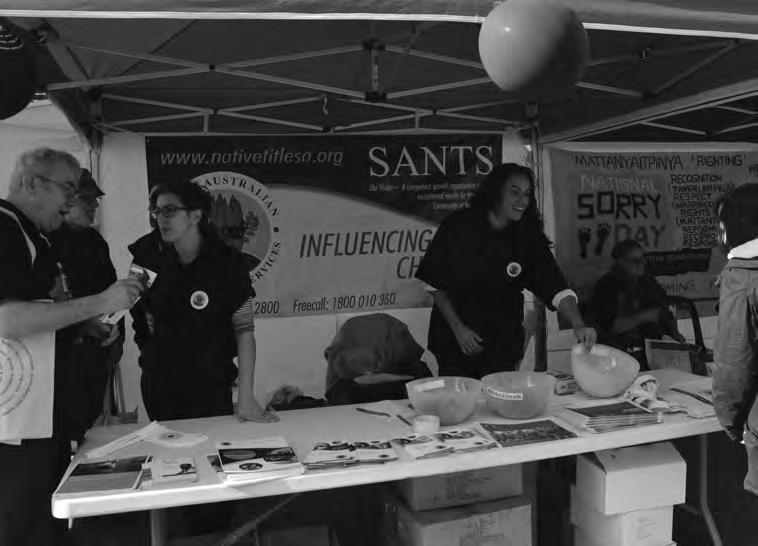
5 minute read
National Sorry Day
On 26 May 2016, the 19th anniversary of the handing of the ‘Bringing Them Home’ report to Federal Parliament SANTS joined many others in Victoria Square/ Tarntanyangga to remember and to celebrate the journey of healing by Stolen Generations.
On this Sorry Day, the crowd heard from the Chair of the Organising Committee, Lynette Croker, Deputy Lord Mayor Megan Hendra, Dwayne Coulthard from the Aboriginal Legal Rights Movement (ALRM), Minister for Aboriginal Affairs Kyam Maher and Independent Assessor for the Stolen Generations Reparations Scheme, John Hill.
Advertisement
Minister Maher and Mr Hill spoke about the Stolen Generations Reparations Scheme, which has now started hearing from claimants and assessing compensation. Mr Hill encouraged community members to contact the ALRM if they would like advice on applying to the scheme. He said that around 200 people had approached the ALRM at that stage and it was expected that around 300 people would make applications to the scheme.

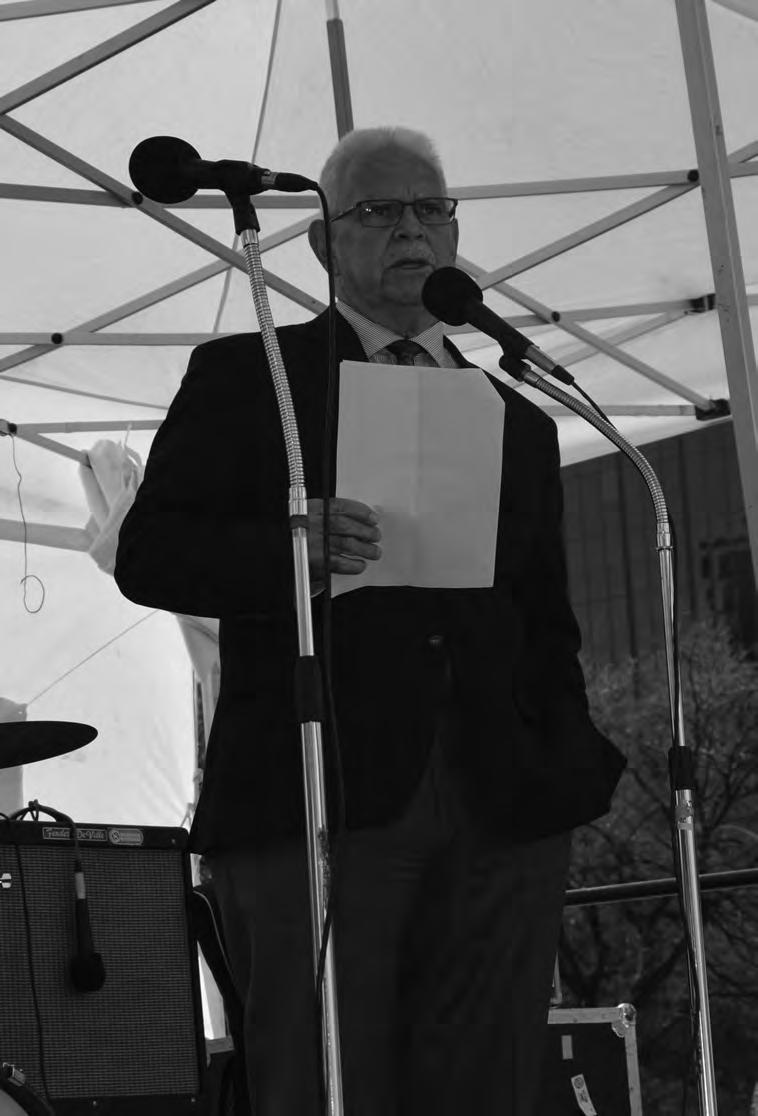
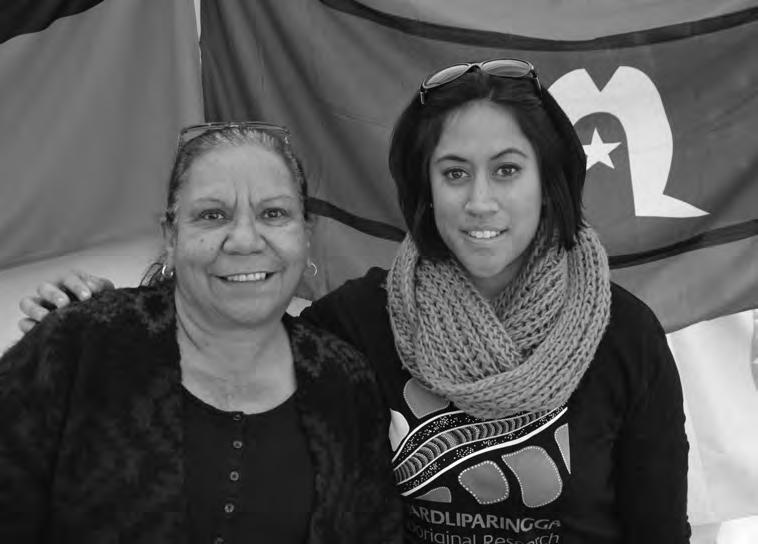

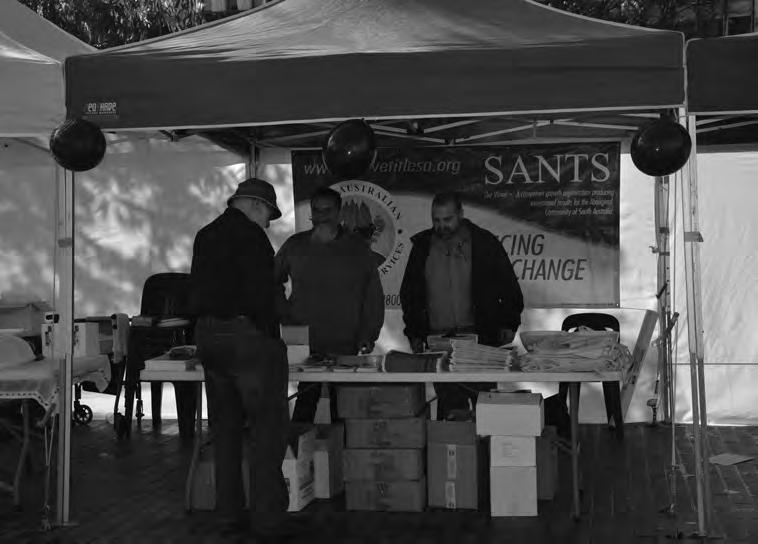
This page, left to right: Top row: SANTS staff Michelle Cioffi and Chantal Bates at SANTS stall; Frank Lampard, Aboriginal Engagement Commissioner. Second row: Julie Cole and Michael Ellul; Rowena Young and Dayna Reweti, The Aboriginal Diabetes Study, SAMRI. Third row: Lynnie Naylo, from Birdsville, Wankangurru country and Lindy Bawden (Gepp), Dieri; SANTS staff Adrian Stanley and Malcolm Lane at SANTS stall.
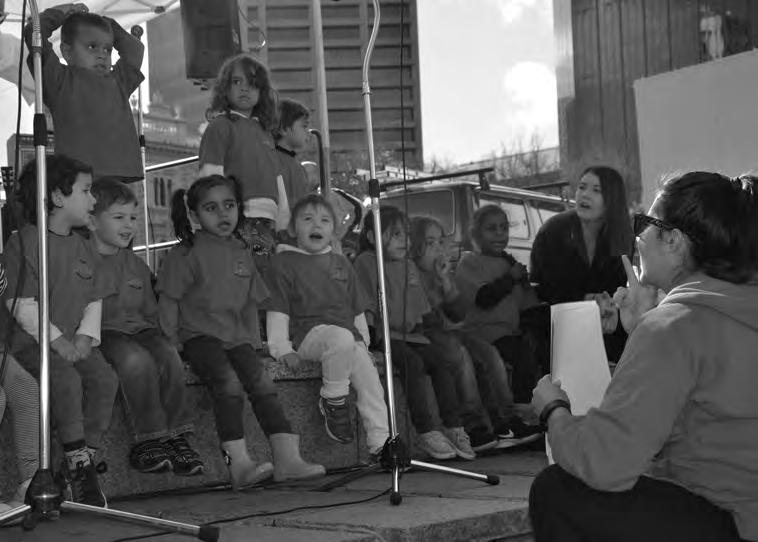
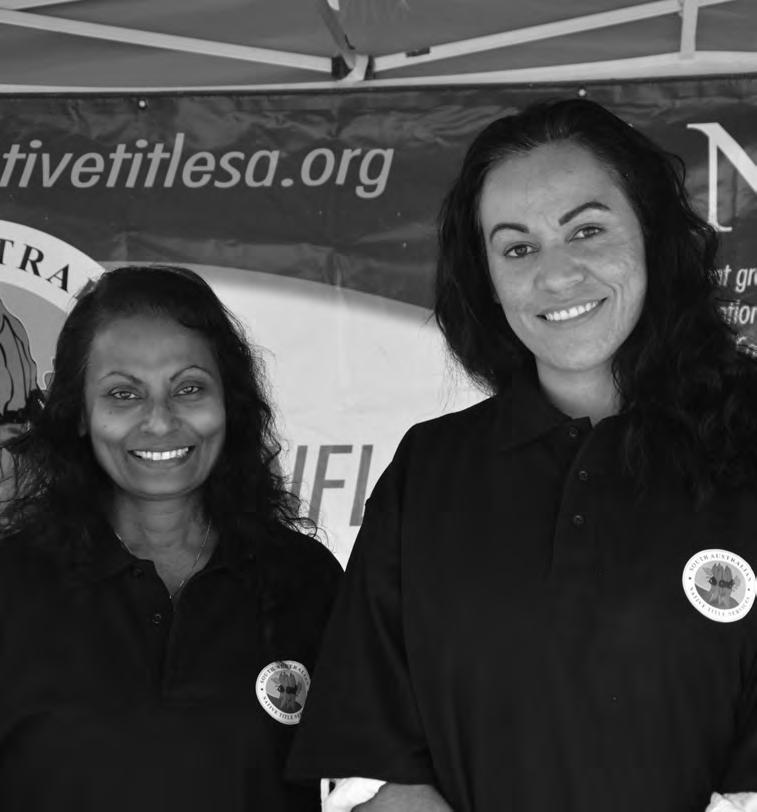
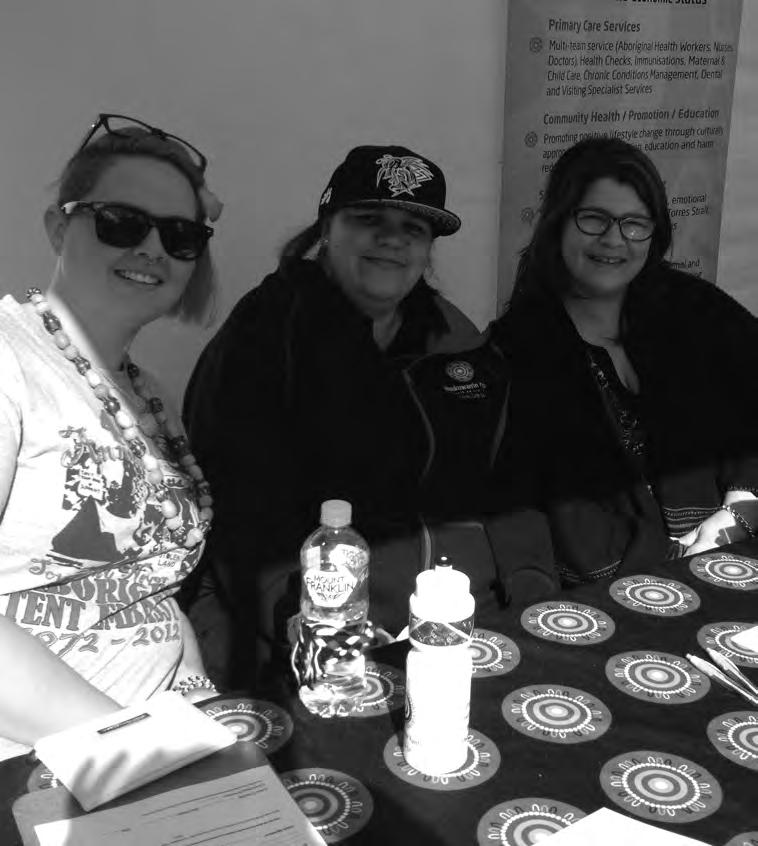
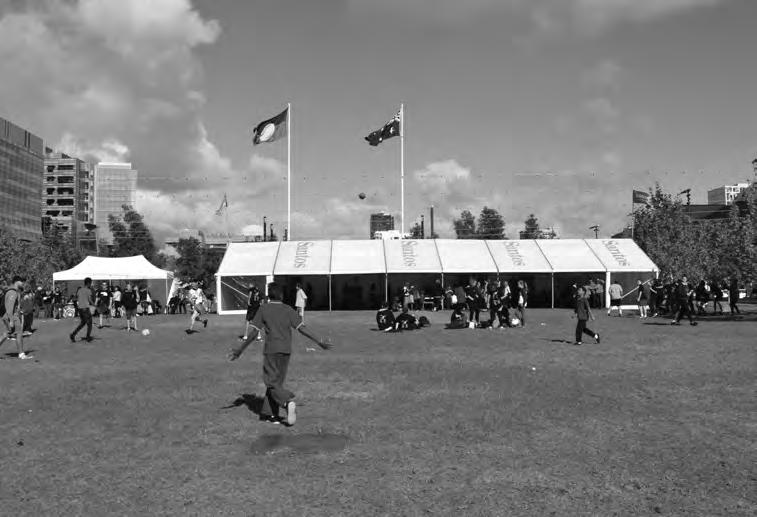
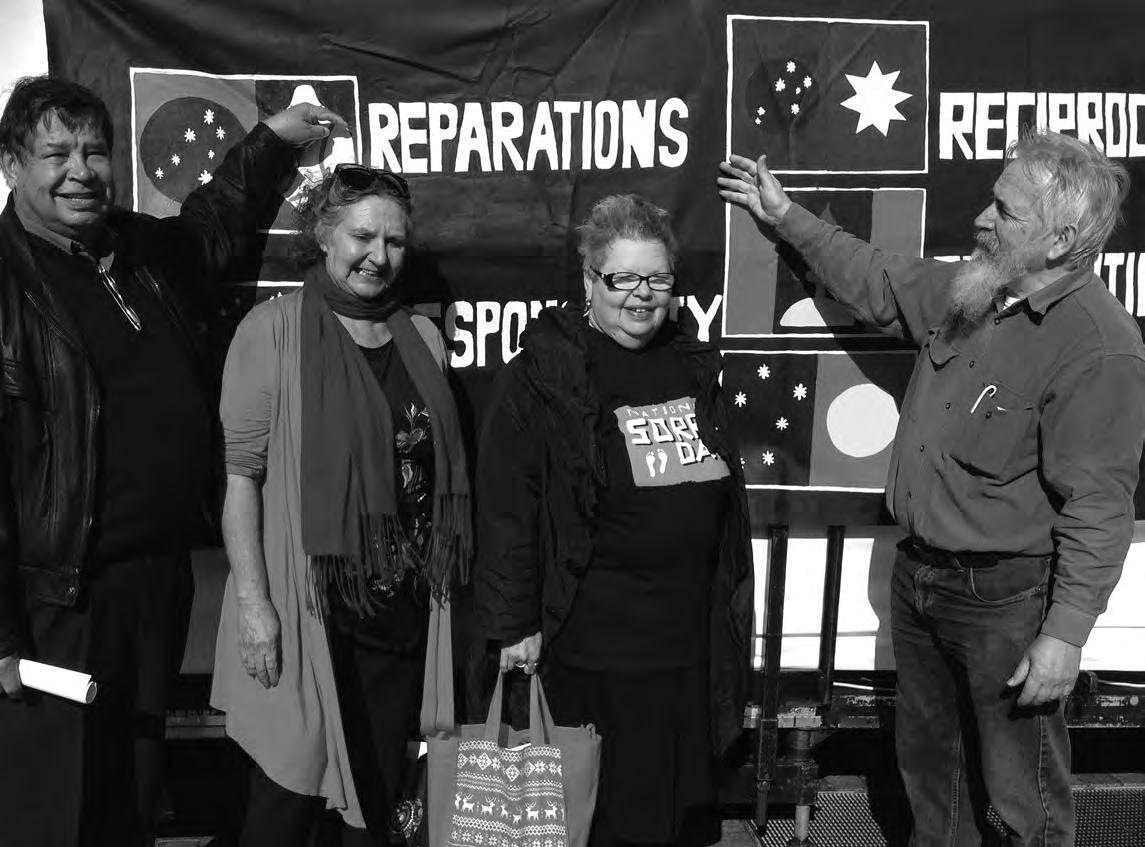

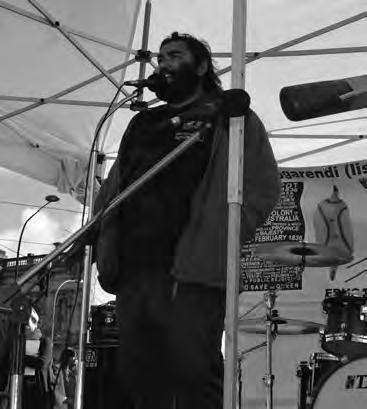
This page, clockwise from top left: Children perform for National Sorry Day; Jess Wilms, Bec Cooper and Tanya Michelle from Link Up; Footy at Tantanyangga; Minister Kyam Maher; Dwayne Coulthard from ALRM; Sorry Day Organising Committee; Maria Almeida and Chantal Bates.
SOUTH AUSTRALIAN NATIVE TITLE SERVICES
Level 4 345 King William Street ADELAIDE SA 5000
Editor
Keith Thomas
Communications Officers
Kaliah Tsakalidis Lucy Kingston
Contributor
Zoe Butler
Designer Alison Fort
Advertising Enquiries
(08) 8110 2800
Circulation
10,000
If you have any stories of interest to our readers, please address any correspondence to: editor@nativetitlesa.org
Aboriginal Way South Australian Native Title Services Level 4 345 King William Street ADELAIDE SA 5000
Ph: 8110 2800 Fax: 8110 2811 FREECALL: 1800 010 360
The Editor has the final decision on all stories and advertising that appear in this publication.
Justice Mansfield leaves Native Title in a good place
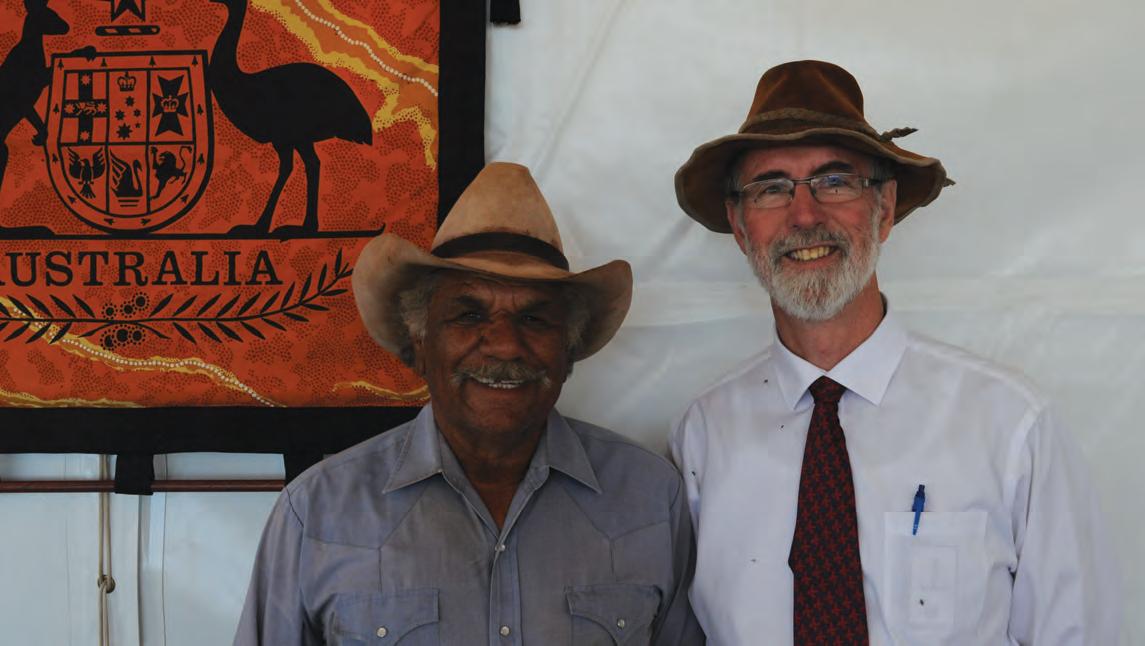
Above: Peter De Rose and Justice Mansfield at De Rose Hill Compensation Consent Determination 2013.
The honorable Justice Mansfield officially retired last month with a formal order of proceedings by the Federal Court.
Justice Mansfield wrote many significant Native Title judgments, including De Rose v South Australia (2013), Nicholls v South Australia (2015), and Croft v South Australia (2015).
His Honour also served as Convenor of the Native Title Committee between 2008 and 2015 and holds an ongoing post as the Aboriginal Land Commissioner. Justice Mansfield was sworn in on 4 September 1996, not long after the Native Title Act was made. His Honour’s work and interest in the area was noted by his colleagues at the formal retirement sitting. “Your work in Native Title has seen you write 145 judgments in the area, including 20 Full Court decisions. Many of these decisions are consent determinations. Those consent determinations often provide the opportunity to explain to a white and Indigenous audience together, through the summarised and agreed views of anthropologists, the stark and confronting aspects of this nation’s history that the judgment in Mabo and the consequential Parliamentary Act in the Native Title Act sought to address in the legal sphere. You have always understood this,” said Justice Allsop. “You have been here since the beginning of the Native Title work, and you have shaped its jurisprudence with clear and sometimes bold expression of ideas, and you have moulded the character of the Court’s approach to its administration,” said Justice Allsop. Andrew Beckworth, South Australian Native Title Services Principal Legal Officer, said “Justice Mansfield made an indelible contribution to the recognition and protection of native title in South Australia and native title jurisprudence generally”.
Stay in touch
Postcode: _____________ Phone: __________________________________________________ Email: __________________________________________________ DX no: __________________________________________________ No of copies: ____________________________________________
Is this an alteration to our current records? Yes No Would you like to be added to the mailing list? Yes No Would you like to be sent regular information about SANTS? Yes No
“His Honour was also instrumental in allowing for a less litigious native title process which has benefitted all parties involved in claims in this State. The benefits of this can clearly be seen in the number and breadth of the consent determinations made in this State during his time on the bench,” said Mr Beckworth. At his retirement, Justice Mansfield remarked how much of the State’s native title is resolved and how the contemporary approaches show collaboration and fulfillment by all parties. “Over the last 10 years or so, the holders of native title have been recognised in almost all of South Australia, north of Port Augusta and extending to the Western Australian border, as well as in some areas closer to the more populated parts of the State. That has been supported, as the consent determinations show, by those who have interests in that land. Pastoralists, local government, mining interests, and others, and they attend the consent determinations and share the joy of them. It is a wonderful advance.
I have been very fortunate to have done a lot of that work, particularly in South Australia and the Northern Territory. I have observed, to the great credit of the Australian community, a very significant attitude change on the part of the wider Australian community towards indigenous Australians,” said Justice Mansfield. Justice Mansfield’s energy and commitment to public service will continue outside the court room as the Chair of the Independent Nuclear Fuel Cycle Royal Commission Consultation and Response Advisory Board, which will consult with the community and provide feedback about South Australia’s proposed future nuclear activities. This area has a direct impact on the Aboriginal community as traditional owners remain worried about potential nuclear waste sites.




